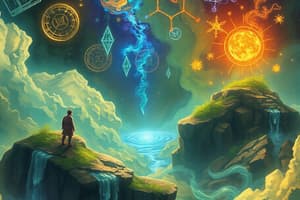Podcast
Questions and Answers
Which of the following best defines a hypothesis in scientific research?
Which of the following best defines a hypothesis in scientific research?
- A proposed explanation that can be tested (correct)
- An observation made during a study
- The final conclusion drawn from an experiment
- A statement that describes a relationship between two variables
What distinguishes scientific laws from scientific theories?
What distinguishes scientific laws from scientific theories?
- Laws can change with new evidence, but theories remain constant.
- Laws are more complex than theories.
- Laws describe what happens, while theories explain why it happens. (correct)
- Laws require extensive peer review, while theories do not.
Which of the following is a characteristic of the control group in an experiment?
Which of the following is a characteristic of the control group in an experiment?
- It remains unchanged to allow for comparison. (correct)
- It is only used in social sciences.
- It shows the effect of the independent variable.
- It receives the experimental treatment.
In the context of scientific reasoning, what does deductive reasoning involve?
In the context of scientific reasoning, what does deductive reasoning involve?
How does scientific knowledge evolve over time?
How does scientific knowledge evolve over time?
What role does peer review play in scientific research?
What role does peer review play in scientific research?
Which of the following branches of science primarily studies human behavior?
Which of the following branches of science primarily studies human behavior?
What is the primary purpose of scientific models?
What is the primary purpose of scientific models?
Flashcards
What is Science?
What is Science?
A systematic process of investigating and explaining the universe through observation, experimentation, and logical reasoning. It aims to develop testable explanations and predictions.
Natural Sciences
Natural Sciences
The branch of science that explores the natural world, including physics, chemistry, biology, and earth science.
Social Sciences
Social Sciences
The branch of science that investigates human behavior and social structures, including psychology, sociology, and economics.
What is a hypothesis?
What is a hypothesis?
Signup and view all the flashcards
What is experimentation?
What is experimentation?
Signup and view all the flashcards
What is correlation?
What is correlation?
Signup and view all the flashcards
What is a scientific model?
What is a scientific model?
Signup and view all the flashcards
Scientific Law
Scientific Law
Signup and view all the flashcards
Study Notes
Introduction to Science
- Science is a systematic enterprise that builds and organizes knowledge in the form of testable explanations and predictions about the universe.
- It uses observation, experimentation, and reasoning to investigate natural phenomena.
- Scientific knowledge is constantly being revised and updated as new evidence emerges.
Branches of Science
- Natural Sciences: Study of the natural world. Examples include Physics, Biology, Chemistry, and Earth Science.
- Social Sciences: Study of human behavior and societies. Examples include Psychology, Sociology, and Economics.
Scientific Method
- Observation: Careful watching and recording of natural phenomena.
- Question: Formulating questions about the observed phenomena.
- Hypothesis: A proposed explanation for the observed phenomena; a testable statement that can be proven or disproven.
- Prediction: A statement of what might happen if the hypothesis is correct.
- Experimentation: A controlled test of the hypothesis to verify or disprove the prediction.
- Analysis: Interpreting the results of the experiment.
- Conclusion: Determining if the hypothesis is supported or rejected based on the analysis.
Key Concepts in Science
- Cause and Effect: Identifying factors that lead to particular outcomes.
- Correlation: Describing a relationship between two variables, but not necessarily a cause-effect relation.
- Variables: Factors that can change in an experiment. Independent variable is manipulated, dependent variable is measured.
- Control Group: A group in an experiment that does not receive the treatment being tested; used for comparison.
- Peer Review: Evaluating scientific work by other scientists in the same field to ensure validity and quality.
- Scientific Models: Simplified representations of complex phenomena to aid understanding. They can be physical, mathematical, or conceptual.
Scientific Laws vs. Theories
- Scientific Laws: Describe observed regularities or patterns in nature. They are concise descriptions of what happens.
- Scientific Theories: Broad explanations that encompass multiple observations, laws, and hypotheses. Theories are well-supported by evidence but can be refined or replaced by new evidence.
Scientific Reasoning
- Deductive Reasoning: Applying general principles to specific situations to reach a conclusion; if A is true, then B must be true.
- Inductive Reasoning: Drawing general conclusions from specific observations; based on patterns observed in data.
Ethical Considerations in Science
- Importance of objectivity and honesty in scientific research.
- Responsible use of scientific knowledge and technology.
- Avoiding bias and ensuring ethical treatment of subjects in research, especially in situations involving human or animal participants.
The Nature of Scientific Knowledge
- Tentative: Scientific knowledge is always subject to revision as new evidence arises.
- Empirical: Based on observations and experimentation.
- Falsifiable: A scientific hypothesis must be testable in a way that could potentially disprove it.
Studying That Suits You
Use AI to generate personalized quizzes and flashcards to suit your learning preferences.




